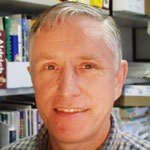
SAN ANTONIO (Dec. 8, 2010) — The Ted Nash Long Life Foundation has awarded $200,000 to the UT Health Science Center San Antonio for studies of stem cells and improvement of lifelong health. The two-year grant began Dec. 1. The leader is Peter J. Hornsby, Ph.D., professor with the university’s Department of Physiology and Barshop Institute for Longevity and Aging Studies.
Aging causes many changes in cells that eventually result in declines in body function and frailty and that increase susceptibility to diseases. The Nash Foundation grant aims to identify aging-related defects that adversely affect properties of induced pluripotent stem (iPS) cells. The ultimate goal is to correct these defects.
The studies will be performed using cells of a small, nonhuman primate, the marmoset. Dr. Hornsby and Suzette Tardif, Ph.D., associate professor with the Department of Cellular and Structural Biology and the Barshop Institute, this year became the first scientists to report generation of iPS cells from the marmoset. This was the second publication on iPS cells from a nonhuman primate, the first being on iPS cells from the rhesus macaque.
Using modern techniques, scientists such as Drs. Hornsby convert adult cells into iPS cells, which act like cells in the early embryo. Pluripotent refers to the iPS cells’ ability to give rise to many different kinds of daughter cells.
The Nash grant will study marmoset iPS cells because of the necessity of testing iPS cell-based regenerative medicine in appropriate animal models before human clinical trials begin.
The Ted Nash Long Life Foundation, based in Waco, Texas, supports medically related research that would improve the length and quality of life for future Americans. This is the first Nash Foundation grant awarded to a scientist in San Antonio.
Private foundations support aging studies
Private foundations have recognized and supported the Health Science Center research program in aging for many years. In 2010 the Ellison Medical Foundation made three major awards totaling $1.7 million to the university’s scientists. Holly Van Remmen, Ph.D., associate professor with the Department of Cellular and Structural Biology and the Barshop Institute, was named an Ellison Medical Foundation Senior Scholar in Aging. This highly competitive, four-year, $888,000 award supports Dr. Van Remmen’s study of cellular energy centers called mitochondria and genetic mutations that lead to increased longevity in mice.
Viviana Peréz, Ph.D., assistant professor with the Department of Cellular and Structural Biology and the Barshop Institute, received a four-year, $400,000 Ellison New Scholar Award. Dr. Peréz is conducting studies of protein stability and aging, comparing different animal models at the Barshop Institute.
Veronica Galvan, Ph.D., assistant professor with the Department of Physiology and the Barshop Institute, also received a four-year, $400,000 Ellison New Scholar Award. Dr. Galvan is studying the effects of neuronal mTOR signaling in the control of aging in mammals. mTOR stands for mammalian target of rapamycin. Last year, the Barshop Institute and collaborators found that the compound rapamycin extended life in mice.
The University of Texas Health Science Center at San Antonio, one of the country’s leading health sciences universities, ranks in the top 3 percent of all institutions worldwide receiving National Institutes of Health (NIH) funding. Research and other sponsored program activity totaled a record $259 million in fiscal year 2009. The university’s schools of medicine, nursing, dentistry, health professions and graduate biomedical sciences have produced approximately 26,000 graduates. The $744 million operating budget supports eight campuses in San Antonio, Laredo, Harlingen and Edinburg. For more information on the many ways “We make lives better®,” visit www.uthscsa.edu.

